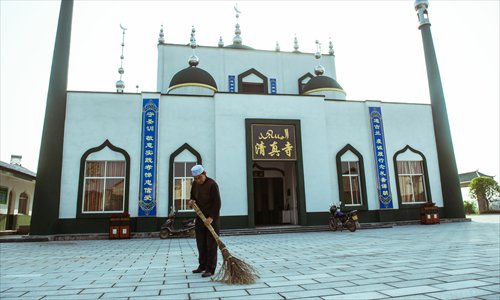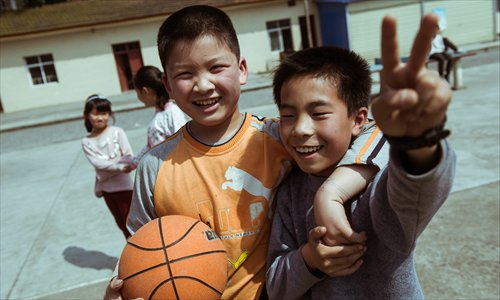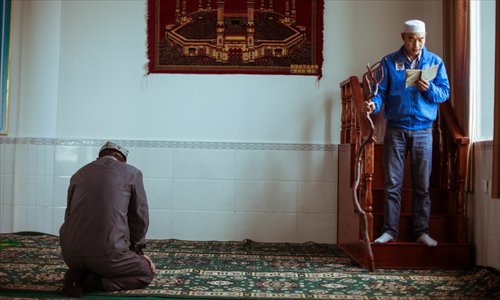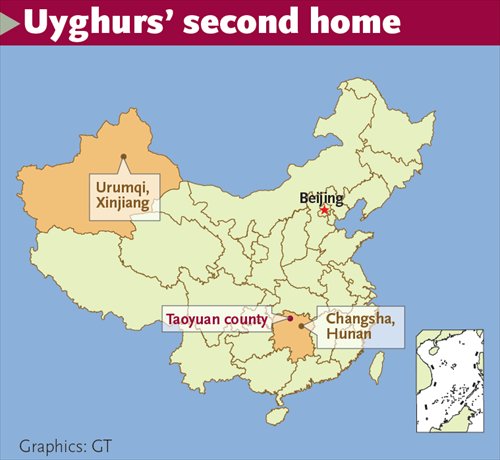Central China town tries to revive 600-year-old Islamic tradition

Sixty-year-old Jian Linxin sweeps the ground in front of the township's mosque. Photo: Li Hao/GT

Kids from several ethnicities, including Uyghur, play together in the elementary school. Photo: Li Hao/GT

Every Friday, some of Fengshu's Muslims come to the mosque. Photo: Li Hao/GT
In Central China's Hunan Province lies the largest habitation of Uyghurs outside of Northwest China's Xinjiang Uyghur Autonomous Region, where the minority has lived in harmony with Han and other ethnic groups for six centuries. After such a long time, they have lost some of their traditional customs. Government-led and civil efforts are underway to retain and recover their culture and religion.

In Fengshu, a town in Central China's Hunan Province, a large campaign to reinforce Uyghur traditions is under way. Aimed at attracting tourists, boosting the local economy and retaining ethnic diversity, the campaign is well-received among most locals, but doubts remain.
In Fengshu, part of Taoyuan county, there are thousands of Uyghurs whose ancestors moved from eastern Xinjiang more than 600 years ago. After centuries of adaptation to local agricultural culture and assimilation to Han customs, many of their distinct ethnic features have vanished. They don't wear Uyghur clothes or speak the Uyghur language. Some even no longer practice Islam.
Nevertheless, you can still distinguish them from Han through facial features like sunken eyes and a high nose ridge. Some old and middle-aged men wear doppa hats, a square or round cap, the most visible symbol by which many in the town show their identity.
In order to draw the township's people back to Islamic customs and revive Uyghur culture, the local government has gone to great lengths, including funding the expansion of mosques, renovation of traditional dwellings, and Uyghur language teaching.
According to Ma Boyi, president of the Taoyuan Islamic Association, more than 160 people in the township returned to Islam last year.
By the same token, to prevent Islamic extremism, local religious leaders and imams are promoting the idea that a true Muslim loves their country and the Party.
Prevent extremism, revive Islam
The 32,000 people of Fengshu township are just 30 minutes by bus from downtown Changde, the nearest large city. A total of 12,000 of the town's residents are from ethnic minorities, including 7,800 Uyghurs and 2,300 members of the Hui people.
Fengshu is one of Taoyuan's star townships. As the second largest home for Uyghurs (outside of Xinjiang) it has earned the county a reputation and support from upper-level governments.
To help retain its ethnic culture and develop tourism, the Taoyuan government has taken a number of steps.
In 2012, it has started a large program to build a "national unity" park in Fengshu with a planned investment of 480 million yuan ($77.3 million), including building a flower and folk culture garden, expanding the township's mosque, remodeling houses in a traditional Uyghur style, and renovating the residence of Jian Bozan (1898 - 1968), a prominent Chinese Marxist historian.
The park attracted 400,000 tourists during last October's holiday travel period.
The influx of tourists has brought great business opportunities to Fengshu. At peak time last year, Jian Xiangdang, a halal restaurant owner, said he served more than 100 tables of customers in one day.
Investors have also arrived in the township, along with more young people who had left to work in other cities. More people have returned to Islam. The villagers have realized that being a Uyghur can help boost their income.
But sometimes, identity can be a problem. Jian Jianjun, director of the Taoyuan Ethnic and Religious Bureau said last year a couple of young people came to him, asking to change their registered ethnicity to Han.
"They complained that some employers and hotels reject Uyghurs. And they are constantly checked by police officers," he said.
At the same time, the county government worries about preventing extremism, especially following every large violent incidents involving Uyghurs, despite the fact there have been no ethnic disputes in Fengshu at any point in its history.
"Since the Urumqi Riots in 2009, almost every year a couple of individuals came to our mosques trying to preach extremism. We told all of them to leave immediately," said Jian Jianjun.
The county has established a network monitoring system, and mosque management committee workers report any suspicious visitors to the government. Jian's mosque's management committee also organizes classes twice a year for religious officials and police officers to study related laws and rules.
"We have also invited experts to interpret the Koran by linking it to socialist core values for imams and Islamic leaders," he said.
The imams, in addition to being trusted by most villagers, are required to pass exams and political examinations organized by religious bureaus, he noted.
Second home's history
According to historical records, the surname "Jian" was bestowed by the Ming Dynasty (1368-1644) Emperor Zhu Yuanzhang upon Uyghur general, Hala Bashi from Turpan, who was sent to Hunan in the 14th century to crush revolts and guard the nation's southern borders. Jian is now a common surname in the township.
The general, his family and his Uyghur and Hui soldiers settled down in the area.
As a result of the collision of nomadic culture with agricultural civilization, the customs of their descendents have changed where housing, dining and clothing are concerned, said Kuang Libo, a professor at the Changde-based Hunan University of Arts and Science.
Jian Tao, Party chief of Fengshu's Uyghur and Hui New Village, said that traditional Uyghur clothes are not suitable for growing rice.
"Due to the humid climate, they do not build adobe beds or hang tapestries; the women do not wear veils as there are no sandstorms," Kuang told the Global Times. "But they will wear a scarf when going to the mosque."
Some have even left Islam to become Taoists or Buddhists.
Jian Xiangfu, director of the largest mosque in Fengshu, argued that some were forced from the religion due to wars and a government campaign against Muslims in the late Qing Dynasty (1644-1911).
Some supposedly also eat pork or animals not killed in proper religious ceremonies. Jian refuted the claim, saying "It mainly happened during periods of famine. And it didn't betray doctrine when their survival was threatened," he told the Global Times, "Now, Uyghurs seldom do that, except some young people who work outside the town."
Islamic doctrine bans inter-religious marriages. In Fengshu, prior to the mid-1950s, marriages were primarily between Uyghurs or Hui, with most marriages between cousins, said Jian Jianjun, director of the Taoyuan Ethnic and Religious Bureau.
"Among the 13 children of my age in the village, two were born with physical defects," Jian Jianjun told the Global Times.
Gradually, though, young people began to look outside their own group, exploring marriages with Han. Now, nearly a third of the marriages involve a Han partner, including Jian Jianjun's own.
At the same time, these Uyghurs have absorbed some Han customs. One particular point of pride is the compilation of genealogies.
"The Uyghurs have no tradition of recording family trees, so the information is basically lost after no more than nine generations. But we learned from the Han to compile a Jian family tree, which is now in its 27th generation," Jian Tao said.
He says his village's people have learned to use the lunar calendar to cultivate paddy fields, as well as the traditional Confucian values of propriety, honesty, honor and filial piety.
"But we've kept our own good customs. We don't drink or gamble," he said.
Revive and rebuild
Many old men in the township hope their offspring can follow basic Muslim customs.
"When the [children] come back for family reunions, they obey Islamic rules like no pork. But when they leave and pass out of my control, I can't ensure that," 75-year-old Zhang Yijun said.
He is Hui, his wife (deceased last year) was an Uyghur, and his son married a Han woman. Although Zhang doesn't wear a doppa, an Islamic calendar and a red plate with an Arabic prayer for safety hung in the main hall of his house still tell of his belief.
The township has started to address the issue. The mosque in the Uyghur and Hui New Village holds classes during summer vacation for villagers to learn about their own history, religion and simple Arabic. The primary school in Fengshu is considering employing a Uyghur teacher to offer bilingual education.
"Food-related customs can be nurtured within a family, but language can't be recovered, since there's no linguistic environment here like in Xinjiang," Kuang, the researcher, said. "Besides, a ritual purification precedes all prayers. The young people are unlikely to have the time," she added.
On Friday, April 24, less than 10 people, mostly elderly, showed up at the mosque.
"The Uyghur culture in Fengshu has faded to some extent along with interaction with Han civilization and modernization, but the fundamental rituals are still kept," Kuang noted.
Apart from celebrating major Islamic festivals, they have preserved traditional weddings and funerals, keeping customs such as inviting imams, and shunning firecrackers and extravagance.
Kuang attributes the persistence of the culture to strong support from Muslims worldwide; another factor, she says, is preferential policy support.
In Fengshu, ethnic groups like Uyghurs automatically have 20 bonus points added to their scores when taking national college entrance examinations, and are also allowed to have second child, she explained.
Besides, thanks to its identity as the "second home of the Uyghurs," Fengshu has benefited from greater attention and financial support than counterparts, and better built infrastructure facilities.
Official local statistics show that the township's Uyghur population has grown in recent years at a rate 15 percent higher than that of the Han population, according to Jian Jianjun, the religion bureau director of Taoyuan county.
Kuang said she has heard of some women in Fengshu who are not willing to marry out of the township, and Han-Uyghur couples who chose to register Uyghur ethnicity for their children.
"The practical benefits have helped reinforce their sense of ethic identification," Kuang said. "The external efforts have promoted an internal revival, as their sense of pride and superiority in being a Uyghur will be intensified."
Newspaper headline: Uyghurs’ second home